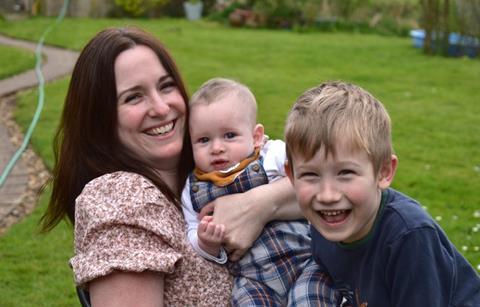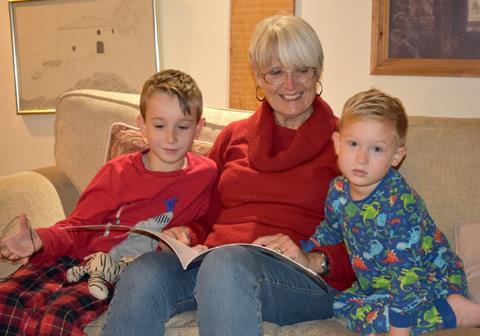Retired head teacher Angie Jones challenges Christian parents to check whether their priorities are based on God’s principles or our consumer-driven culture.
I sat in the conference centre and listened. The man with the microphone said that the future workforce of the UK – engineers, directors, managers and even builders – would become increasingly female. That day I failed to recognise the implications of this statement.
I was a young primary school teacher.
Some 20 years later I sat in another school hall. Life had moved on; now I was a headteacher. Another conference was in full swing. The speaker had a different message…yet it was a direct consequence of the earlier one coming true. He said that soon we’d have all-age schools, for children from a few weeks old right through to 18 and every school would provide wrap-around childcare from early morning until early evening.
“Babies will be issued with a keyring holding a photo of their mum, so they know who the key person in their life is,” he announced with a flourish.
When he asked for questions I nervously raised my hand and cleared my throat. Across the sea of heads, my voice sounded out: “What’s wrong with leaving little children with their mothers?” I asked. A murmur went around the hall – I know not whether in agreement or disapproval.
The man smoothly brushed aside my question and moved on. The moment had passed.
The needs of young children
A hard-hitting report entitled The Next Generation was released by the Centre for Social Justice in 2008. The think tank, chaired by MP Iain Duncan Smith, found that many problems in young people have their roots in separation from parents at an early age.
It highlighted the fact that close family relationships reduce the likelihood of many physical and psychological problems such as anti-social behaviour, substance misuse, mood disorders and chronic diseases such as obesity, asthma and chronic obstructive pulmonary disease.
It proposed that child benefit be increased for the first three years of a baby’s life in order for mums to stay at home.
Principle 6 in Declaration of the Rights of the Child (adopted by the United Nations in 1959) states: “The child, for the full and harmonious development of his personality needs love and understanding.
He shall, wherever possible, grow up in the care and under the responsibility of his parents, and in any case, in an atmosphere of affection, moral and material security. A child of tender years shall not, save in exceptional circumstances, be separated from his mother.”
 Angie’s daughter-in-law Sarah is a stay at home mum to her two boys
Angie’s daughter-in-law Sarah is a stay at home mum to her two boys
Bucking the trend
In my school there was a nursery. It was housed in the spare classroom that adjoined the one where I taught two days every week. From there I could hear the cries of the tiny children, calling “mummy” and I would sometimes see parents, late for work, hurry by my classroom window, with tears streaming down their faces.
One of the nursery helpers said to me: “They’re too little, they only want their mums. I overheard the manager of the nursery on the telephone by my office say: “Oh yes, we take them the day after their second birthday.”
Then a new pressure came. “When will your school open a breakfast club and provide wrap-around childcare like other local schools?” I refused.
When prospective parents came to view my school and asked me about this provision I said they needed a different school. I did not want children effectively ‘at work’ for nine or ten hours a day.
But the battle to follow the trend was relentless and it wasn’t easy to stand my ground. Getting women back to work meant more taxes and more revenue for the national treasury and in this scenario children had become economically inconvenient.
When I retired nine years ago, one of the first things the new head did was to open a breakfast club.
An ongoing impact
I firmly believe a child’s early years should be spent at home with his or her mother or father in order to establish the fundamental bond between parent and child. This gives a firm, secure foundation, a stability, to face the many problems that life will inevitably present.
The converse is true.
The 2020 Children’s Society Good Childhood Report, based on research by University of Essex, tells us that in the UK there has been a significant decline in 10–15-year-old children’s happiness over the last decade.
It says that this can be a warning sign of potential issues in later teenage years and urges that young people need help to…guess what…build relationships!
We throw up our hands in horror at the rise of mental illness in our young people, while ignoring the fact that the way we treat them as babies could well be where it begins.
If don’t feel cared for – you don’t care.
 Angie with her grandsons Eli and Ethan
Angie with her grandsons Eli and Ethan
The hidden cost of consumerism
Proverbs 1:8-9 says: “Listen to your father and mother. What you learn from them will stand you in good stead” (Living Bible).
The most beautiful thing we can give anyone is our time. The fleeting years we have with our children quickly pass and how many of us regret in later life that we put jobs before our little ones?
Parents often say: “We need to earn more money, to pay the bills and mortgage.” Of course. But there’s another question we need to consider also. How did we get to this place? And the answer is by deliberate design.
The consumer-driven society we live in is not an accident. Advertising and government policy deliberately push us all into wanting more: holidays in the sun; a bigger house; better car; the same toys as our child’s friends have; the latest smart phone; a coffee and cake in the café etc. And for this we need more money – so both parents have to work.
It’s clever. Both increased tax payments and income from childcare strengthen the economy.
They say we’re in a ‘cost of living crisis’. May I venture to rephrase this to a cost of lifestyle crisis.
The problem for working mums and dads is that hurried ready meals at the end of a tiring day are expensive and not as healthy as freshly cooked food.
Writer Maurice Jones said: “Exhausted and sometimes guilt-laden working parents may have higher incomes but they also have fewer moments in a day left for their children, themselves or their community.
“God does not expect the lure of increased earnings to take precedence over homemaking and meaningful parenting. Sacrificing parenthood on the altar of economic gain does not sit well with the One who brought family life into being.”
Choosing a different way
My daughter-in-law Sarah is a full-time mum. Her three little boys are her world. Her lifestyle doesn’t fit with her peers – she doesn’t have spare cash as they make do with one salary (my son is a teacher). They don’t have a mortgage, but rent a house. It is a choice they have made and I applaud them for it.
Jackie Kennedy Onassis once said: “If you bungle raising your children, I don’t think whatever else you do well matters much.”
It’s a sobering quote for parents to think upon, as is the scripture in Romans 12:2 says: “Don’t let the world squeeze you into its mould but let God re-mould your minds from within” (JB Phillips).





























No comments yet